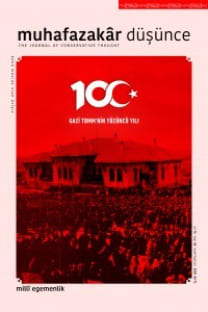AŞIRI SAĞIN YÜKSELİŞİ: RESME KÜRESEL PERSPEKTİFTEN BAKMAK
Aşırı Sağ, Küreselleşme, Küresel Yönetişim, Müslüman Karşıtlığı, Uluslararası İlişkiler
___
- AKKERMAN, T., Rooduijn, M. (2015). ‘Pariahs or partners? Inclusion and exclusion of radical right parties and the effects on their policy positions’, Political Studies, 63: pp. 1140- 1157.
- ALLEN, T. J. (2017). Exit to the right? Comparing far right voters and abstainers in Western Europe, Electoral Studies, 50: pp. 103-115
- Amnesty International. (2017). Annual Report 2016-2017: The State of the World’s Human Rights. London: AI Publications.
- ASLAN, H. K. (2017). “Chapter 7: Global Political Economy” In Nejat Doğan & Joseph Drew Eds. Introduction to International Relations, Eskişehir: Anadolu University Publications.
- CHARRON, N., & Rothstein, B. (2014). Social trust, quality of government and ethnic diversity. Working paper, Quality of Government institute, 20.
- ECKARDT, A., (Sep 9, 2013). Far-right politicians distribute racist condoms ahead of German vote, Retrieved from NBC News Portal: https://www.nbcnews.com/news/other/far-rightpoliticians-distribute-racist-condoms-ahead-german-vote-f8C11115243
- ELİAÇIK, Z. (28 Eylül 2017). Alman siyaseti ve medyasında aşırı sağ yanılgısı. Retrieved from Anadolu Ajansı, http://aa.com.tr/tr/analiz-haber/alman-siyaseti-ve-medyasinda-asirisag-yanilgisi/921887. Europe’s Welfare states: Battle of the benefits. (2018, Jaunuary-February 27-02). Economist.
- GARBER, M. (2012). Vested Interests: Cross-Dressing and Cultural Anxiety, New York: Routledge.
- GENÇ, H. D. (2018). “Responding to Irregular Migration: High Potential of Local Governments in Turkey,” International Migration.
- GENÇ, H.D., Duygu Öztürk-Tunçel. (2017). “Chapter 8: Globalization and Global Society” In Nejat Doğan & Joseph Drew Eds. Introduction to International Relations, Eskişehir: Anadolu University Publications.
- GOODWIN vd. (2012). “The New Radical Right: Violent and Non-Violent Movements in Europe” Institute for Strategic Dialogue Brief Paper. Retrieved from https://www.academia. edu/1572331/The_New_Radical_Right_Violent_and_Non-Violent_Movements_in_Europe
- GOUREVITCH, P. (1978). The second image reversed: The international sources of domestic politics. International Organization, 32(4), 881-912.
- GOUREVITCH, P. (2002). “Domestic Politics and International Relations” In W. Carlsnaes, T. Risse and B. Simmons, (Eds). Handbook of International Relations, London: Sage, pp. 309–328.
- GRATWOHL, D. (2012, Nisan 5). Retrieved from Deutsche Welle: http://www.dw.com/tr/ avrupada-sa%C4%9F-pop%C3%BClizm-y%C3%BCkseliyor/a-15862968
- GREEN, E. (2017, May 9). It Was Cultural Anxiety That Drove White, Working-Class Voters to Trump. Retrieved from The Atlantic: https://www.theatlantic.com/politics/archive/2017/05/ white-working-class-trump-cultural-anxiety/525771/
- GREEN, J., COLIN, H. (2015). Towards a New Political Economy of the Crisis: Getting What Went Wrong Right. New Political Economy, 20:3, 331-341.
- GRILLO, R. D. (2003). Cultural Essentialism and Cultural Anxiety, Anthropological Theory, 3(2), pp. 157-173.
- HALIKIOPOULOU, D., VLANDAS, T. (2015). The Rise of the Far Right in Debtor and Creditor European Countries: The Case of European Parliament Elections. The Political Quarterly, 86(2), 279–288.
- In Their Own Words: Marine Le Pen and Emmanuel Macron. (2017, May 5). Retrieved from The New York Times: https://www.nytimes.com/2017/05/05/world/europe/emmanuel-macronmarine-le-pen-quotes.html
- JOBBIK. (2010). Radical Change. Retrieved February 15, 2018: https://www.jobbik.com/sites/ default/files/Jobbik-RADICALCHANGE2010.pdf
- JORDAN, M. J. (2010). “The Roots of Hate,” World Policy Journal, 99–111.
- MUDDE, C. (2014). “The Far-Right and the European Elections”, Retrieved October 19 2014: http://www.unitedagainstracism.org/wp-content/uploads/2014/05/Cas-Mudde-Euroelections-2014_CH-article.pdf
- MUDDE, C. (2013). “The 2012 Stein Rokkan Lecture: Three Decades of Populist Radical Right Parties in Western Europe: So What?”, European Journal of Political Research, Vol. 52, pp.1-19.
- MUDDE, C. (2012). “The Relationship between Immigration and Nativism in Europe and North America”, Migration Policy Institute, Washington, pp.1-32.
- MUDDE, C. (2007). Populist Radical Right Parties, Cambridge: Cambridge University Press.
- ORENSTEIN, M. A. (2014). ‘Putin’s western allies’, Foreign Affairs, 26 March 2014,
- ÖNER, S. (2014). Different Manifestations of the Rise of Far-Right in European Politics. The Cases of Germany and Austria, Marmara Journal of European Studies, 22(2), pp. 85-106. Party Programme of National Democratic Party of Germany (NPD), (2010), Retrieved at February 16, 2012, http://www.npd-sh.de/index.php
- PETKOVA, M. (16.12.2017). The death of the Russian far right: How the Kremlin destroyed the far right in Russia, while backing it in the West. http://www.aljazeera.com/indepth/features/2017/11/death-russian-171123102640298.html Pew Research Center (2017). The Changing Global Religious Landscape, Retrieved from http:// www.pewforum.org/2017/04/05/the-changing-global-religious-landscape/
- POLYAKOVA, A., ANTON S. (2016). “On The Rise: Europe’s Fringe Right.” World Affairs 179(1), pp. 70–80.
- RANKIN, J. (The Guardian, 6 Sep 2017). EU court dismisses complaints by Hungary and Slovakia over refugee quotas, Retrived from, https://www.theguardian.com/world/2017/sep/06/ eu-court-dismisses-complaints-by-hungary-and-slovakia-over-refugees
- RYDGREN, J. (2005). Is extreme right-wing populism contagious? Explaining the emergence of a new party family, European Journal of Political Research, 44(3), pp. 413-437.
- RYDGREN, J. (2013). Class Politics and the Radical Right. Abingdon: Routledge.
- SCHLUETER, E., SCHEEPERS, P. (2010). The relationship between outgroup size and antioutgroup attitudes: A theoretical synthesis and empirical test of group threat- and intergroup contact theory, Social Science Research, 39(2), pp. 285-295.
- SIMPSON, P. A. (2016). Mobilizing Meanings: Translocal Identities of the Far Right Web, German Politics & Society 34(4), pp. 34-53.
- STOCKEMER, D. (2017). The Economic Crisis (2009-2013) and Electoral Support fort he Radical Right in Western Europe,” Social Science Quarterly, (98)5: pp. 1536-1553.
- United Nations – UN. (2011). The Global Social Crisis: Report on the World Social Situation, New York: United Nations Publications.
- VARGA, M. (2014). Hungary’s “anti-capitalist” far-right: Jobbik and the Hungarian Guard, Nationalities Papers, 42(5), pp. 791-807.
- VARGA, M. (2008). How Political Opportunities Strengthen the Far Right: Understanding the Rise in Far-Right Militancy in Russia, Europe-Asia Studies 60(4), pp. 561-579.
- VELASCO GONZÁLEZ, K. , VERKUYTEN, M. , WEESIE, J., POPPE, E. (2008), Prejudice towards Muslims in The Netherlands: Testing integrated threat theory. British Journal of Social Psychology, 47: 667-685.
- WARDE, İ. (2016). Wagering on Sectarianism: The Political Economy of Extremism. Muslim World, 106: 205–216.
- ISSN: 1304-8864
- Yayın Aralığı: 2
- Başlangıç: 2015
- Yayıncı: Enderun Tanıtım Hiz. Org. Yapım Basın Yayın Medya Turizm İnş. San. Tic. Ltd. Şti
AŞIRI SAĞIN YÜKSELİŞİ: RESME KÜRESEL PERSPEKTİFTEN BAKMAK
İSLÂMİYET VE ASRÎLİK - YAHYA AFİF
AVRUPA’DA “AŞIRI SAĞ”IN DİNÎ-İDEOLOJİK VE TARİHÎ TEMELLERİ-KÖKENLERİ
BATI’NIN MÜSLÜMAN “ÖTEKİLERİ”NİN HİKÂYESİ
Kübra Güran YİĞİTBAŞI, Feyza Ünlü DALAYLI
ROMA CİVİTAS’INDAN MODERN BATI SİVİLİZASYONUNA UZANAN TARİHSEL ÜÇLEME
